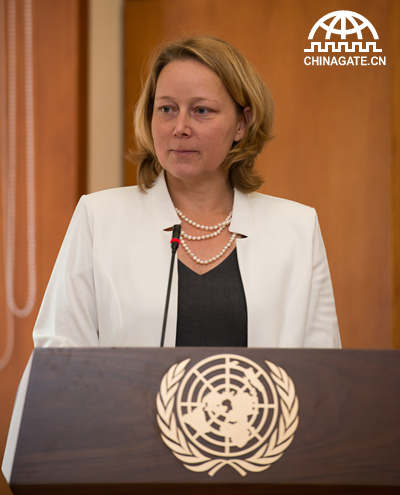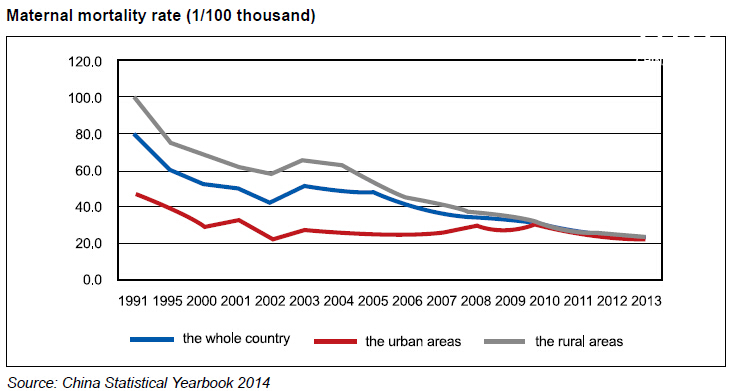UNDP official: China contributed 76% of global poverty reduction
chinagate.cn by Jiao Meng, October 15, 2015 Adjust font size:

Ms. Agi Veres, Country Director of UNDP in China,photo by Chen Boyuan
China has overall contributed achieving 76% of global poverty reduction to date. Many developing countries see China as an inspiration for achieving development results, said Ms. Agi Veres, Country Director of UNDP in China, during an exclusive interview with chinagate.cn.
Q: UNDP’s evaluations to China’s poverty reduction issues
A: The progress made by China in its development-oriented poverty reduction effort has had a major impact on the global poverty reduction process.

In particular, and according to China’s Progress towards the Millennium Development Goals, a report prepared by the Ministry of Foreign Affairs of the People’s Republic of China and the UN Country Team in China, China managed to achieve MDG1 - the goal focused on poverty reduction - well ahead of time, lifting hundreds of millions of people out of poverty. China has also met others goals, such as those relating to universal primary education, safe drinking water and sanitation, and maternal mortality.
While several other developing countries also met such goals - for example 20 countries as different as Bangladesh, Malawi and Brazil met MDG1, of course they met them to a far smaller absolute scale compared to China. It is estimated that China has overall contributed overall achieving 76% of global poverty reduction to date.
This happened because China was focused on it.
For instance, from the 1990s onwards the Chinese government began to develop national poverty reduction strategies. In 1994, the first-ever poverty relief action plan in China’s history was released, with clearly defined objectives, targets, measures and a deadline to help lift 80 million people out of poverty. This was followed by two further China Rural Poverty Reduction and Development Programs from 2001-2010 and 2011-2020.
Similarly, the State Council Leading Group of Poverty Alleviation and Development and its Office (LGOP) is a very special and important government mechanism for consolidating efforts for effective poverty reduction. Few countries have this sort of agency, and we believe it demonstrates just how much China prioritizes reducing poverty. Indeed, the funding allocated to poverty reduction has continued to increase, and more favorable policies are being adopted constantly to provide a more enabling environment to strengthen people’s self-resilience.
Over the past 30 years, UNDP, including with and through the International Poverty Reduction Center in China (IPRCC), has been assisting in this process through comprehensive and innovative approaches aimed at addressing the root causes of poverty. For example, UNDP established microfinance pilots in 49 counties across 17 provinces and autonomous regions as early as 1994. We continue to support poor and low-income farmers and entrepreneurs in remote rural areas even today, with more innovative approaches being piloted, such as credit cooperatives, agent banking and mobile banking, often targeted specifically at ethnic minority women.
Q: UNDP’s comments on China’s promises to fulfill post 2015 sustainable development goals
A: In May this year, China became one of the first countries – even before the SDGs were agreed at the UN Summit this September – to commit to integrating the SDGs in its national development plan. This commitment was a major first step, and UNDP strongly welcomed President Xi’s address to the UN General Assembly as it was very positive in this regard.
The year 2016 in particular, will be critical for making this integration happen. Indeed, now is when the work really begins. And there are three activities that are critical.
First, in each country, including China, the global goals now need to be prioritized and adapted to national priorities. Here in China, that means linking the global goals and China’s next five year plan, which will run from 2016 to 2020. It is already clear that China’s next five-year plan will emphasize stable economic growth, structural economic shifts, and priority areas such as green growth, ensuring well-being and poverty eradication. There may therefore be a smaller number of the global goals that are extremely pertinent for China to prioritize. China can use those prioritized global goals as a means to examine the plan, attract new ideas and policy suggestions in particular areas. The UN can support this process, and share such ideas.
Second, the global goals now need to be tracked. For this, data will be critical. From collecting household data to inform poverty reduction strategies, to collecting industry data to support economic and environmental management, to using data to create and manage smart cities, China is a leader on the data front. Creating the right systems to track progress of all the global goals in China, especially where there still remain gaps such as on the extent of major illnesses such as HIV and AIDs, will be critical. China can count on the UN to support this process, as we did during the millennium goals era.
And last but not least, the global goals will now need to be implemented. For this, in China, the actions by provincial and local governments as well as businesses and non-governmental organisations will be critical. All of these actors need to be fully aware of the global goals, the specific priority goals for China, and commit themselves to implementing them at the same time as they also commit to delivering the 13th 5 year plan. That is why forums like the Global Poverty Forum, convened by LGOP, which bring together a range of partners – from the very high level to the grassroots level –, are critical. A key lesson from the millennium development goals era is that we cannot make global goals a reality unless we all know them well and we join hands together.
UNDP and the Chinese government have joined hands together for over 30 years. We have worked together to eliminate poverty, to address environmental challenges, and more recently partnered to share China’s unique development experiences with the world, while also supporting China to strengthen its approach to South-South and Global Cooperation. In the global goals era, we will remain steadfast development partners.